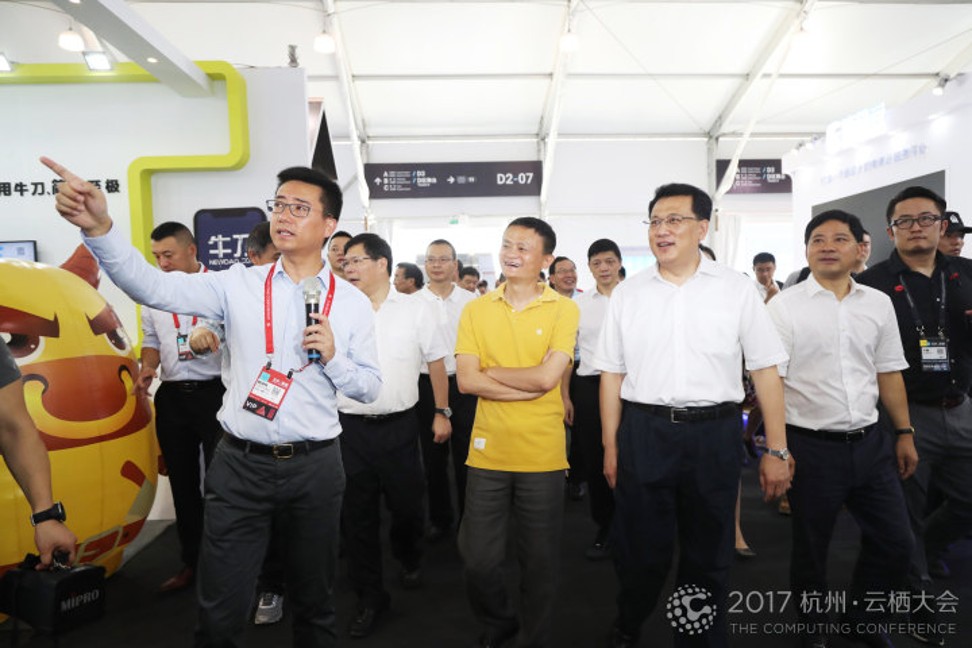
Alibaba to spend more than US$15bn on technology research with launch of collaborative academy
E-commerce giant will open seven labs globally as part of project that executive chairman Jack Ma says will also contribute to ‘society and the era’
Alibaba Group has pledged to spend more than US$15 billion on research and development over the next three years – a big step-up by the e-commerce juggernaut whose market cap now stands side by side with Amazon.
Through the Alibaba Damo Academy, its first global initiative in technology collaboration, the company aims to bankroll some of the most frontier research, ranging from data intelligence, internet of things and fintech to quantum computing and human-machine interaction.
“We are now looking for talented researchers to join us in the quest for original and disruptive technologies that will ultimately change the world,” Jeff Zhang, the group’s chief technology officer, said during an announcement at the Alibaba Computing Conference, held at the group’s headquarters in Hangzhou, on Wednesday.
Alibaba, which owns the South China Morning Post, will open seven research labs in Beijing, Hangzhou, Singapore, Moscow, San Mateo and Bellevue in the United States and Tel Aviv as part of the project. These will focus on areas that include machine learning, network security, visual computing and natural language processing.
Zhang will head the Damo – or Discovery, Adventure, Momentum and Outlook – Academy, which is looking to recruit 100 talented researchers from around the world.
“The Alibaba Damo Academy will be at the forefront of developing next-generation technology that spurs the growth of Alibaba and its partners,” said Zhang.

The decision comes months after Alibaba’s executive chairman, Jack Ma, vowed to double down on research, figuratively upgrading his team from a workshop making “hand grenades” into one “developing missiles”.
Ma said that thanks to the talent and technology China boasts, the academy is positioned to overtake research facilities built by IBM, Microsoft and Intel as the global leader in technology research.
But rather than seeing the academy as a technology powerhouse driving business growth at Alibaba, Ma said it would also contribute to “society and the era”.
“The technologies development from Damo Academy is expected to serve at least 2 billion consumers around the world and help Alibaba create 100 million jobs worldwide by 2036,” he said.
Ma aims to make Alibaba the world’s fifth-largest economy in the next 20 years. And to reach that goal, the group must build on the continuing development of technological infrastructure, he added.
The move marks a big step up in research spending – the company reported a product development expense of US$2.48 billion in the fiscal year ending in March 2017, a 24 per cent increase from a year ago.
While the group did not disclose overall research costs, payroll and share-based compensation towards development accounted for 11 per cent of total revenue, according to Alibaba’s annual report.
“At its core, Alibaba is a technology company. As recent financial results show, staying ahead of the curve in areas such as artificial intelligence and machine learning has been positive,” said Kirk Boodry, an analyst with the UK-based equity and debt research firm New Street Research.
Alibaba, the operator of the world’s largest online shopping platform, has been driving China’s AI programme together with its two biggest rivals, Baidu and Tencent Holdings, catching up with the US in investing in machine learning and natural language processing.
The Damo Academy announcement comes as the group’s shares rose for eight trading days in New York to a record high, surpassing Amazon at one point on Tuesday to become the world’s biggest e-commerce company by market cap.
“Research and development for internet of things and fintech helps with monetisation and business expansion, whilst spending on quantum computing and human-machine interaction could also be defensive as disruption from these technologies could be higher,” Boodry said.


